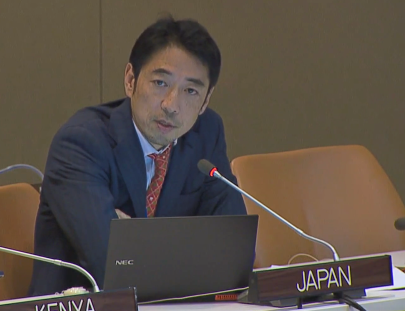平和構築委員会(PBC)南スーダンにおける制度とガバナンスを通じた平和構築に関する大使級会合における水田公使参事官ステートメント
令和4年10月26日

(As delivered)
Thank you, Madam Chair, for convening this meeting. I also appreciate Minister of Peacebuilding, Minister of Defence, and Minister of Health of South Sudan, and all the other briefers for their valuable updates and inputs. I take this opportunity to congratulate the Government of South Sudan for the creation of the Ministry of Peacebuilding.
Japan concurs with previous speakers that the implementation of the revitalized peace agreement remains the urgent and core priority for South Sudan. In this belief, Japan, over the past five years, has provided more than 12 million USD to help implement the agreement mainly through supporting the activities of The Intergovernmental Authority on Development (IGAD) and Reconstituted Joint Monitoring and Evaluation Commission (RJMEC). Furthermore, in 2020, Japan made contributions in kind to the IGAD to expedite security arrangements and improve security in South Sudan.
Today, I would like to make the following three points to emphasize the importance of placing local populations at the center in the government’s efforts to promote security and provide public service delivery through institution-building.
First, in order to promote and ensure security, it is vital for the government to build trust with local communities, and capacity-building of security institutions is a key element in this regard. For this reason, Japan has provided assistance to the police for their capacity-building. We hope that such assistance will contribute to furthering security sector reform and ensuring the rule of law in South Sudan.
Second, it is essential that the government is equipped with the necessary means and capacity so that public services actually reach local populations. Infrastructure is critical in this regard. In order to help South Sudan develop key infrastructure such as bridges, water supply and waste management systems, Japan has provided grant aid of around 106 million USD since 2015. Japanese Self-Defense Forces personnel deployed to the United Nations Mission in South Sudan (UNMISS) engaged in infrastructure development.
Third, it is important to prioritize public services delivery for vulnerable populations, particularly women. For instance, Japan has been providing assistance in cooperation with UN Women for COVID-19 prevention through women’s capacity-building and ensuring their access to information and PCR testing kits. This assistance has also addressed the potential risk of sexual violence by providing safe vaccination sites and PCR laboratories. Such assistance also aims to further strengthen women’s livelihoods in South Sudan and chart a course toward long-term sustainable development.
In concluding, let me reiterate Japan’s continued commitment to supporting South Sudan’s efforts to strengthen its institutions and governance and promote economic growth.
I thank you.
